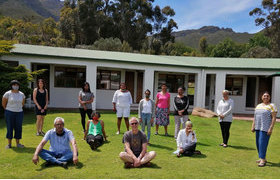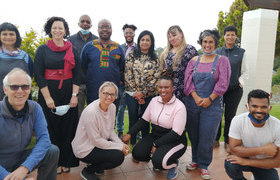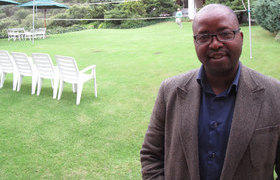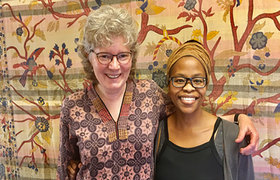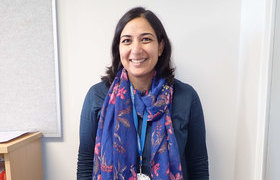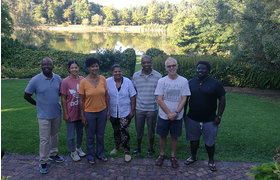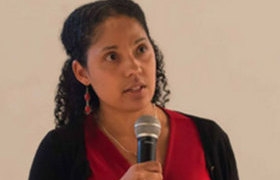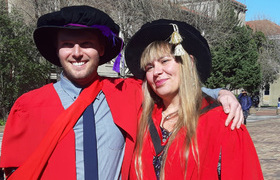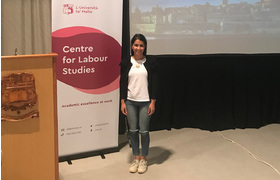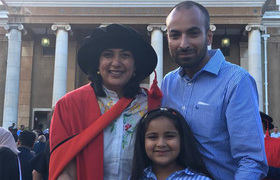Negotiating learning and identity
19 December 2017 | Story Supplied. Photos Robyn Walker.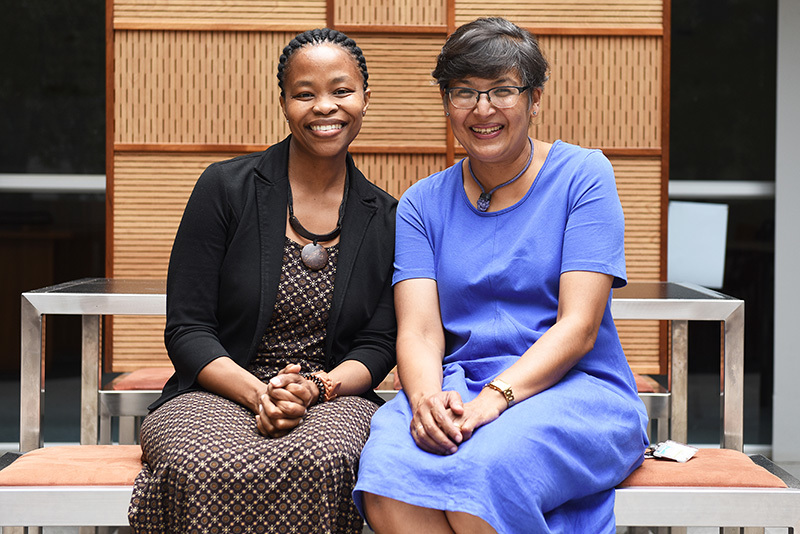
The lived experiences of working-class and rural black students are the subject of a new book edited by Dr Bongi Bangeni and Associate Professor Rochelle Kapp, titled Negotiating Learning and Identity in Higher Education: Access, Persistence and Retention (Bloomsbury).
“My teachers told me that I was not going to make it.”
These words came from a first-year occupational therapy student at the University of Cape Town (UCT) in 2009. Despite her teachers’ low expectations, failing her first semester, and having to negotiate considerable challenges on campus, she graduated successfully in 2013.
She then returned to her home village to work, “so that at least people who are poor from my background can benefit from this type of provision”.
This remarkable resilience, resourcefulness and persistence is commonplace among the students who participated in the research for the book, say Bangeni and Kapp. The book is based on two qualitative longitudinal case studies by 10 UCT academics across five faculties. The first study was supported by the National Research Foundation and the second by the Mellon Foundation.
Through interviews with 120 students and analysis of their assignments, the research traced the participants’ journeys throughout their undergraduate years and in some cases to postgraduate study.
“In order to gain insight into how and why they persist despite obstacles, we focused on the ways in which participants viewed the world, reasoned, strategised, took decisions, used resources and positioned themselves as they negotiated multiple, often conflicting discourses within the institution and between the institution and their home environments.
“The research makes visible the considerable learning and identity challenges that students face, particularly in a time of societal transition where dominant institutional norms and values have retained power but are also subject to contestation.”
Support and progression
The book describes how participants’ learning experiences at school restricted them and constrained their choice of degree and career paths. It also examines the challenges entailed in negotiating the transition from school to university.
The participants were well supported in their first year, say Kapp and Bangeni. However, their struggles in subsequent years raised important questions about the nature of the first-year academic support and the forms that this support should take between first and subsequent years.
Crucially, the book illustrates how student learning is often impeded by limited choices in degree structures and a lack of coherence within the degrees. In addition, lack of alignment within and between courses became an increasing challenge when the demands increased in volume and complexity in the senior years.
“While the first year of university is foundational, and clearly plays a key role in students’ ability to succeed, our research problematises the notion that intense support and reduced load in the first year prepares students adequately for further study.
“These findings imply the need for more flexible degree pathways, sustained support tailored to students’ needs, and greater alignment between intended pedagogy and pedagogy within and across curricula.”
Identity central to learning
A substantial body of research has recognised that identity is central to learning, say Bangeni and Kapp.
“An awareness of how students negotiate a sense of self is crucial to addressing factors which cause engagement and disengagement.”
“Nevertheless, higher education practices still tend to construct identity as marginal to epistemic access. The data shows how students were rendered passive by disciplinary discourses that seemed to offer very limited scope for debate and alternative positions,” they said.
Lecturers made assumptions about students’ prior knowledge and experience, but seldom engaged them on the subject. When curriculum content focused on local issues that were central to the participants’ lives, or on deeply held norms and values, these were often not subject to debate.
“The notion that they would recast their identities and language practices was assumed. So the potential for learning from tensions between home and institutional values and practices was missed,” they continued.
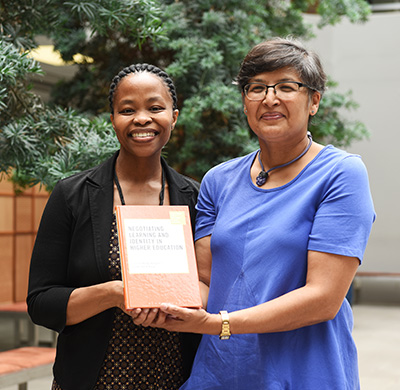
“While recent protests have centred around a critique of Anglo-centric curricula, it seems that most of the participants’ sense of alienation stemmed from their position as marginal outsiders to academic engagement rather than to the curriculum content per se.”
Simultaneously, the participants’ family and neighbourhood communities expected them to retain home identities while their increasing fluency in English and their shifting norms and values often positioned them as outsiders.
This positioning had a material reality as well. Both the university and the students’ families assumed that they were adequately funded. Nevertheless, they were constantly made aware that they were living well in comparison to their poverty-stricken families, and family needs constituted a major source of stress and pressure.
The data shows how the participants’ hopes, sense of well-being and choices were constrained and thwarted by financial problems, fear of failure and the need to meet expectations both at home and at university.
No easy answers
“Our research provides no easy answers,” say Bangeni and Kapp. “But travelling alongside the participants, listening to their stories of challenge and success, and analysing their writing has given us a more nuanced sense of the labyrinth that students face as they negotiate learning and identity.
The data would suggest that an awareness of how students negotiate a sense of self is crucial to addressing factors that cause engagement and disengagement in the learning process.
“We argue that the challenge is not to reify identity or romanticise students’ backgrounds, nor is it to silence critical voices. Meaningful access to learning entails providing enabling environments which facilitate exploration, reflection and robust critical engagement.”
 This work is licensed under a Creative Commons Attribution-NoDerivatives 4.0 International License.
This work is licensed under a Creative Commons Attribution-NoDerivatives 4.0 International License.
Please view the republishing articles page for more information.
Next Generation Professoriate (NGP)
The Next Generation Professoriate (NGP) is a mid-career academic staff development and support programme. Funded by the vice-chancellor’s Strategic Funds, the NGP addresses demographic inequalities in the academic hierarchy. The goal is to help members become associate and full professors.
The NGP was officially launched in September 2015. By the end of 2018, four of its members had been promoted to full professor and a further 14 had reached the rank of associate professor.
The programme is led by Dr Robert Morrell, who has over 35 years of academic experience in South African universities. He has a B1-rating from the the National Research Foundation (NRF) and is an elected member of the Academy of Sciences in South Africa.
Newsletters
In the news

